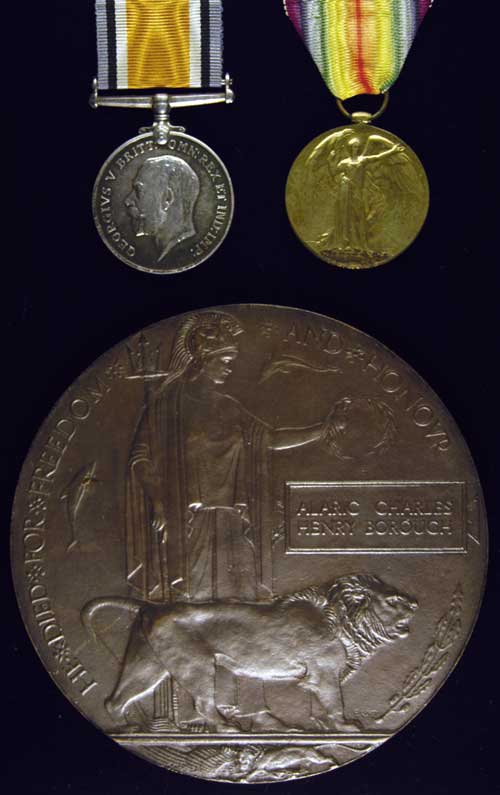
Auction: 7012 - Orders, Decorations, Medals & Militaria
Lot: 379
A 1917 ´Cambrai, Gonnelieu Ridge´ Casualty Pair to Lieutenant A.C.H. Borough, Welsh Guards, One of Only Thirteen Officers of the Regiment Killed Leading Their Medn into Action During the Great War British War and Victory Medals (Lieut. A.C.H. Borough.), extremely fine, with Great War Bronze Memorial Plaque, ´Alaric Charles Henry Borough´, with photographic images or recipient and copy service papers (3) Estimate £ 2,400-2,800 Lieutenant Alaric Charles Henry Borough, of Chetwynd Park, Newport, Shropshire; born 1892; educated at Stubbington House, Fareham and Charterhouse, the latter having a room named after him; left school in 1910, to study teaplanting in Ceylon; returned to England with the outbreak of the War; joined Inns of Court Officer Training Corps, January 1915; Second Lieutenant Royal Inniskilling Fusiliers, Reserve of Officers, May 1916; passed out from Sandhurst and subsequently joined the Welsh Guards; served during the Great War with the regiment in the French Theatre of War, 13.3.1917-1.12.1917; Borough was killed in action on the latter date during the attack on Gonnelieu ridge, Cambrai, where he was leading No 2 Company, ´In front of the men were Webb, well ahead on the right, Borough, Roderick and Hargreaves on the left, quiet dignified figures lying with there faces to the enemy´ (Regimental History refers); the Brigade of Guards was to capture the Gonnelieu ridge and the high ground to the south of it, ´The Welsh Guards would have the Grenadiers on their left; on their right would be 2nd Guards. Eleven tanks would co-operate; time of attack 6.30am....... At a brief conference with his company commanders, Lieutenant-Colonel Gordon ordered Nos. 3 and 4 Companies to make up the first wave, No 2 [Borough´s Company] the second; Prince of Wales Company would be in reserve. There was just time for a brief reconnaissance of the start-line, a railway embankment, and for the companies to form up, when the order was given for the advance. By now the moon had gone down and was misty. None of the promised tanks had turned up, and the companies plunged up the hill into darkness. Because there had been no time for a proper reconnaissance in daylight, and because there were even no proper maps, it was not appreciated that behind the apparent crest of the objective was a slight depression. In the depression, and covering the false crest, the Germans had posted a number of heavy machine guns. As leading companies approached the false crest, they were caught, first in the light of star shells, and then in a whirlwind of fire beyond anything so far experienced in the war. Of the 370 men in the attacking waves. 248 were down in three minutes, of whom 57 were killed. The din was so tremendous that the Commanding Officer and his second-in-command, Major Humphrey Dene, had to shout into each other´s ears to make themselves heard. Then, out of the queer half-light of a misty dawn lit by star-shells, came a long line of dazed, blood-covered, crying and cursing men, the survivors and wounded stumbling back.´ (The Welsh Guards, J. Retallack, refers); Borough was posthumously gazetted Lieutenant 24.12.1917, antedated 22.8.1917, he is buried in Gouzeaucourt New British Cemetery.
Sold for
£1,400




